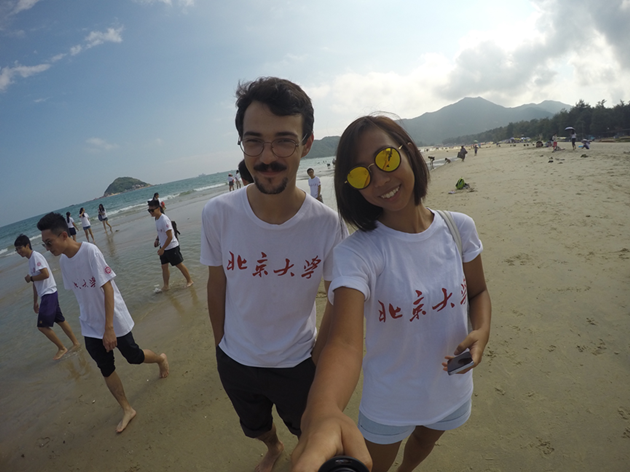This is the Second in a series introducing some of the international students at Peking University HSBC Business School.
 Rosalyn Jeon went diving in the Philippines during China’s national holiday in October . At sunrise, she gets ready for a dive to see thresher sharks.
Rosalyn Jeon went diving in the Philippines during China’s national holiday in October . At sunrise, she gets ready for a dive to see thresher sharks.
Rosalyn Jeon, an Ivy League graduate from South Korea, is pursuing a master’s degree in economics. After graduating from Cornell University with a degree in finance, she worked four years in Seoul at KB Asset Management Co., Ltd. The company invests in public equity and fixed income markets across the globe.
Though a bold decision to quit her job and come to China to further her education, Jeon saw it as a natural choice. As a trader and a portfolio manager, Jeon started to realize that as China’s economy was on the rise, a lot of markets and countries were depending on its policies and money flow. “It’s important to know what’s going on in China, especially when you are in the financial market,” she said.
Since her undergraduate education at Cornell was more about practical skills rather than theoretical training in economics, Jeon felt that an education in economics was a must for career development. “With solid knowledge in economic theories, I can have more fundamental tools at my disposal to make precise conjectures about the economy and formulate concrete trading decisions” she remarked.
Like most international students, Jeon finds the language barrier is a thorny issue to handle. She admitted, “I think PHBS is the only business school on mainland China that offers economics in English, and my Chinese is not good enough to study at the graduate level.” Jeon then added that Shenzhen’s internationalization, rapid development and being close to Hong Kong also serves as a plus for PHBS.
 Jeon with her classmate Xavier Lemyre , a French-Canadian student, during PKU's fall outing to Xichong beach.
Jeon with her classmate Xavier Lemyre , a French-Canadian student, during PKU's fall outing to Xichong beach.
However, it has taken her some time to switch roles from practitioner to student, getting used to all the exams, quizzes and homework. Further, Jeon has found the difference in educational approaches challenging. The economics program here is highly theoretical (which is what she wanted to learn), but the classroom experience focuses more on lectures than being interactive, she said. Taking advanced macroeconomics, Jeon thinks it’s a bitter-sweet experience, saying that “though it’s challenging, I’m learning to explain things more mathematically and theoretically.”
Jeon said that the study load is heavy, and “I study a lot more than I expected.” However, she thinks the heavy load has a silver lining because it will help students learn how to cope with multiple tasks and work under stress, a requirement for those working in the financial market. “Being a trader is very stressful. You have to win in the market, learn practical tactics, and deal with your institutional clients at the same time,” Jeon reflected.
As for the gaps between reality and her expectations about studying here, Jeon maintained that the resources at PHBS far exceeded her expectations. The newly-established financial lab is what impressed her the most. Having worked as a trader, she knows the beauty of the lab, saying that “just sitting here, you can use Bloomberg, set up Excel models, and simultaneously try out your models to see how the market is fluctuating in real time.”
 Jeon in Cebu, Philippines gesturing, "Awesome!” She said that whenever she is stressed, she feels like diving because it’s an escape from reality and helps her feel refreshed.
Jeon in Cebu, Philippines gesturing, "Awesome!” She said that whenever she is stressed, she feels like diving because it’s an escape from reality and helps her feel refreshed.
After experiencing the challenging trader life, Jeon knows for certain that she is more of a research type than a practitioner, so she hopes to work as an analyst next and believes the master’s degree will serve as a stepping stone for her future.
Jeon said graduates should know themselves, be aware of their strengths, weaknesses, likes and dislikes. They should align themselves to the types of jobs that fit who they are. “If you are not a people person, then you shouldn’t apply for institutional sales just because it is, for instance, Goldman Sachs.”
By Annie Jin
Edited by Priscilla Young
For the First in this Series, Click Read more

















